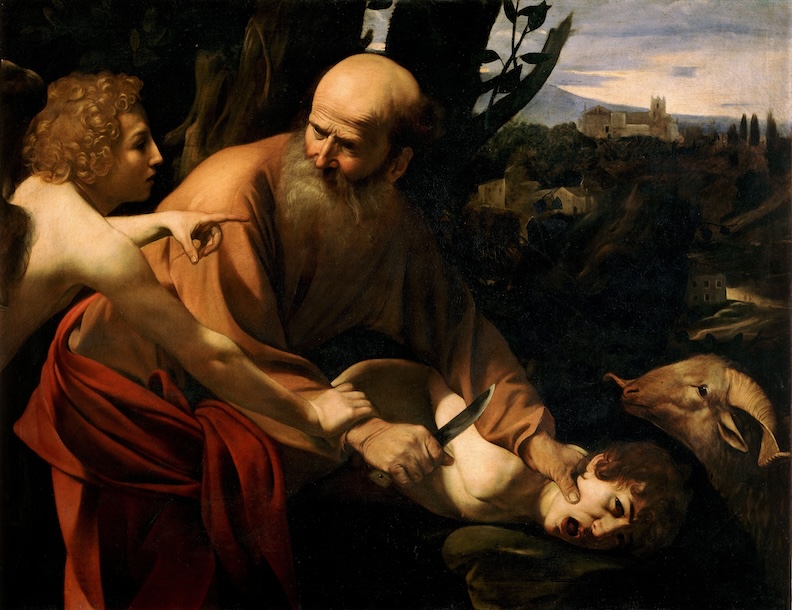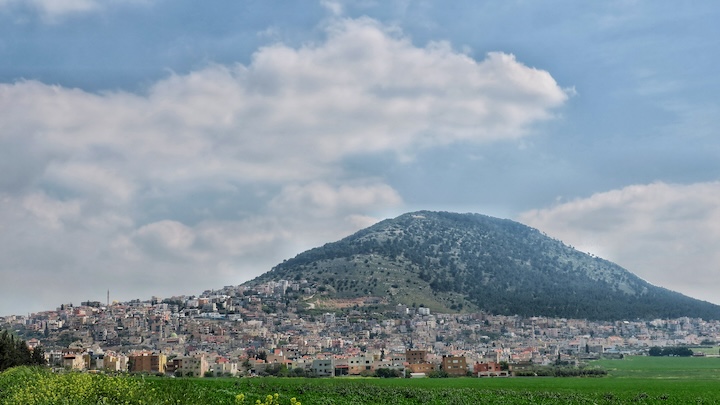A significant theme throughout salvation history is the ascent of a holy mountain. Abraham ascends Mount Moriah and Moses Mount Sinai. David ascends Mount Zion and there his son builds the temple, after the pattern that Moses saw on Mount Sinai. Later, after the contest of sacrifices on Mount Carmel, Elijah returns to Mount Sinai. As the new Moses, Jesus goes up the mountain to give the new law. He later ascends Mount Tabor and ultimately the mount that is called the Place of the Skull, Calvary.
Two of Scripture’s most important mountains figure prominently in today’s Mass. First, Mount Moriah where Abraham, obedient to God’s command, goes to sacrifice his son Isaac. (Gn. 22) Second, Mount Tabor, where Jesus goes to be transfigured before Peter, James, and John. (Mark 9:2-10) This tale of two mountains frees us from false notions about God and reveals what He desires for us.
First, Mount Moriah. “God put Abraham to the test. . .‘Take your son Isaac, your only one, whom you love, and go to the land of Moriah. There you shall offer him up as a holocaust on a height that I will point out to you.’” What kind of god would do this, would ask a man to sacrifice his own son? Jews and Christians have struggled with this question for millennia. But in Abraham’s day it wouldn’t have been a pressing question. Human sacrifice was not uncommon in the ancient world. In fact, the practice surrounded Abraham. The command to sacrifice Isaac might simply indicate that Abraham’s god is not much different from others.
But the whole point of the scene is just the opposite. God is teaching Abraham that he isn’t like those other gods. He brings Abraham all the way up there to impress upon him precisely this point, that He doesn’t require human sacrifice.
This is strong medicine. It’s aggressive treatment for serious spiritual illness. The events on Mount Moriah are the First Commandment in dramatic form, the Lord in effect saying to Moses, “I am the Lord your God, you shall not have other gods before me.” Do not think that I am like the other gods, who require inhuman and barbaric things of you.
False gods destroy us and lead us to sacrifice those we love. We don’t fall into this today as did the Philistines, Carthaginians, or Aztecs. But we have our little gods: our petty little kingdoms of control, our comfort, possessions, wealth, and pleasure – our own will. To these, we sacrifice our marriages, families, and children. We literally sacrifice our children to the false god of sexual freedom. But we sanitize the procedure and call it not “sacrifice” but “reproductive freedom.”

Mount Moriah raises a fear we have about God, that devotion to Him will mean a lessening of life for us. Like Abraham, we will lose what’s more important to us. This is Satan’s lie that we are in competition with God, that more of Him means less of us. If we let Him into our lives too much, we will somehow lose. Which brings us to that second mountain – the Mount of the Transfiguration, commonly known as Mount Tabor.
“And he was transfigured before them, and his clothes became dazzling white, such as no fuller on earth could bleach them.” In contrast to the scene on Mount Moriah, the Father brings his Son up this mountain not for sacrifice but for glory, to reveal His glory and – more to the point – the glory He desires for all His children, for you and me. The Father desires not to demean or shame us but to raise and to glorify us with the glory of His only Son.
To get there, we need to ascend another mountain: Calvary. The road to glory is sacrifice. God desires to raise us up in glory. But for that to happen, we must part with the things of this world – with our control and possessions and pleasures. Christian sacrifice is demanding, and it may at times seem as though we are being crushed. But sacrifice is not the end. The lesson of Mount Tabor is that Christian sacrifice is directed not to our annihilation but to our glorification.
On the way up Mount Moriah, Abraham speaks words not included in today’s reading.
Isaac observes that they have everything necessary for the sacrifice: “Here are the fire and the wood, but where is the sheep for the burnt offering?” That is, What are we going to sacrifice? In response Abraham speaks words of great faith and meaning: “My son, God will provide the sheep for the burnt offering.”
God will provide. Even at that moment Abraham trusted that God would provide a sacrifice – technically, a lamb. This, of course, is fulfilled in Christ. In fact, Mount Moriah is where, years later, the Temple would be built and is the same mountain on which our Lord was crucified. Christ is the Lamb of sacrifice that Abraham trusted God would provide. It is Christ, the Father’s Son, his only-begotten Son, his beloved Son, who offers Himself in sacrifice for us.
Which brings us to one more mountain to ascend: the altar of the Mass. There we encounter both sacrifice and glory. The priest ascends – and you with him – to offer the Sacrifice of the Mass. The priest then extends the Eucharist, the glory of God’s humility and our pledge of future glory.
















